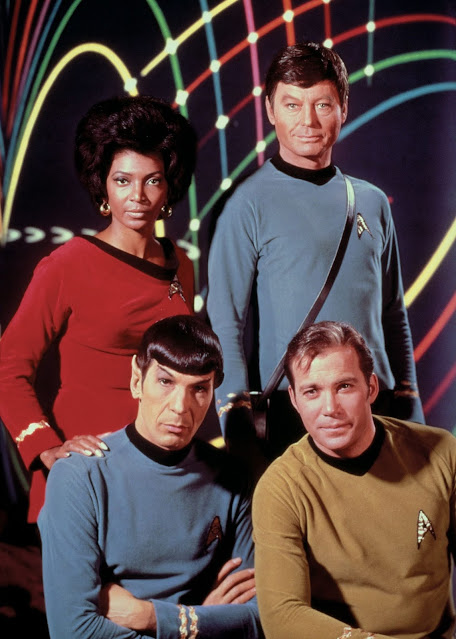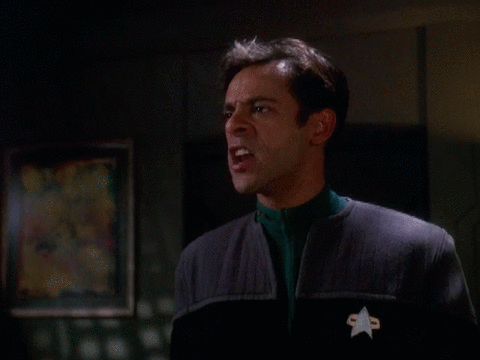As I write this we're less than 24 hours away from Star Trek: Discovery's season four premiere in the United States. Discovery was the first Star Trek show to completely break away from the episodic format. Rather than tell 13 different stories every season, Discovery (and its sibling, Picard) tells one story broken up into 13 pieces.
In an online discussion, someone pointed out that Dr. McCoy once shot himself up with space heroin and erased time and they fixed that mess in 45 minutes. That got me thinking about how "The City on the Edge of Forever" would work if if were a modern Star Trek show. I imagine it might go something like this:
Episode 1 "Waves in the Sea of Time, Part 1": Weird things happen when Federation colonies are hit by "time waves". The Enterprise is sent to find their source. McCoy and Spock notice that Kirk seems upset about something.
Episode 2 "Waves in the Sea of Time, Part 2": Time waves cause more weird things to happen. Spock comes up with an algorithm to compute their exact source. "This is the power of math!" We learn that Kirk is hurting because got a "Dear James" letter from his girlfriend. End on Spock's algorithm pinpointing the source of the waves.
Episode 3 "There Be Squalls Ahead": Enterprise en route to the source of the time waves. McCoy finds out about Kirk's breakup. He shares that he's feeling dissatisfied with life in space. Wishes for a simpler existence on Earth. Time waves cause tech problems for Scotty. Episode ends with ship in danger.
Episode 4 "Typhoon" : Much action and peril as time waves threaten to tear the ship apart. Different ways to modify the shields to protect the ship are tried, but nothing works. Just in the nick of time, Scotty discovers the solution and implements it. We drop out of warp at the source of the waves: a mysterious, remote planet.
Episode 5 "Unsafe Harbor": Investigation of the planet begins. Time waves continue to buffet the ship. McCoy is being run ragged caring for all the injured. Just as the worst appears to be over, he's called to the Bridge to help a wounded Sulu. Accidentally shoots himself up with cordrazine.
Episode 6 "The Darkness That Runs Through the Soul of Man": A dangerous hide-and-seek as the characters chase a cordrazine-overdosed McCoy through the ship. We cut between their perspective and his terrifying hallucinations. McCoy knocks out the transporter chief and escapes to the planet as the episode ends.
Episode 7 "What World Lies Beyond That Stormy Sea": Notice that we're halfway through the season and the story is only just now getting started. Kirk leads a landing party to the planet to retrieve McCoy. We find the Guardian, learn what it is, and then McCoy jumps through and changes history. What took five minutes in 1967 takes 45 here.
Episode 8 "Into Time's River": Kirk and Spock hatch their plan to go through the Guardian, get McCoy, and fix history. The encounter with and flight from the police officer is much longer and more action-packed here. Episode ends just as Edith Keeler discovers them in the basement of her mission.
Episode 9 "The Light in the Heart, The Dark in the Night": Kirk and Spock acclimate to life in 1930s NYC. Fish-out-of-water moments, some dangerous and some humorous. Edith Keeler speechifies about the future, and Kirk starts to get all googly-eyed. Elsewhere in the city, McCoy appears. In his paranoid state, he kills the homeless man he encounters. Episode ends with him fleeing into the night.
Episode 10 "Stone Knives and Bearskins and Murder": Spock gets the idea to build a memory circuit. Kirk and Edith begin their romance. Meanwhile McCoy, still suffering from the effects of the cordazine, kills a couple guys who try to mug him. Kirk and Spock read about the killings in the paper and wonder.
Episode 11 "Spocky Mnemonic": Spock makes progress on his memory circuit. Kirk confides in Edith about his recent failed romance and gets dangerously close to telling her who he and Spock really are. The cops close in on McCoy.
Episode 12 "The Heart Wants What the Future Cannot Possess": Spock conducts several tests of his memory circuit as the Kirk-Edith romance continues. Spock realizes that Edith must die for history to be set right. Cops hunting for the hobo killer find an unconscious drunk in a bloodstained Starfleet uniform. Nearby, McCoy is in the drunk's clothes, shivering as he comes down from the cordrazine. Spock tells Kirk that Edith must die just as McCoy stumbles into the mission.
Episode 13 "Return to Tomorrow's Past Future": Edith nurses McCoy back to health. It's clear he has only vague memories of his actions under the cordrazine's influence. A few near misses as Kirk and Spock almost cross paths with him. Meanwhile, a police detective has realized who's really responsible for the murders and traced McCoy's steps to the mission. McCoy flees just as Kirk and Edith are leaving on their date. He sees Edith about to get hit by the truck and gives up his chance to escape to save her. Kirk stops him, and Spock steps out of the shadows and nerve-pinches the cop before he can arrest McCoy. The Guardian pulls them back to the 23rd century. McCoy is obviously troubled by what happened and will need much help to recover. (Naturally this will all happen offscreen and he'll be 100% fine by next season's premiere.) Kirk is sad about the end of yet another romance, but he finishes out the season with a Grey's Anatomy voiceover about how sometimes we look to the past to find our future, and in that future we find the stars, and in the stars we find hope, and in that hope we find ourselves.
And that's how you stretch a 45-minute story into 13 episodes. The trick is to add a lot of additional activity but no actual depth, lots of noise but no substance. You can have big emotional moments, but they should be like the explosions in Michael Bay movies: loud, spectacular, and impressively done from a technical perspective, but with no lasting effects on the characters.
Hooray for 21st century television.






















